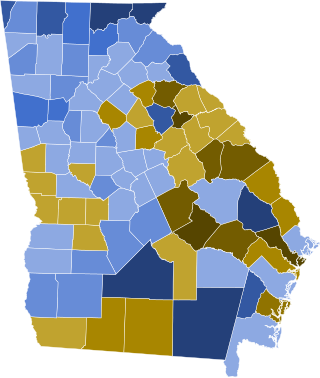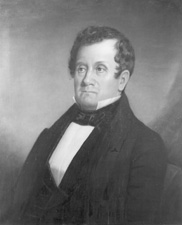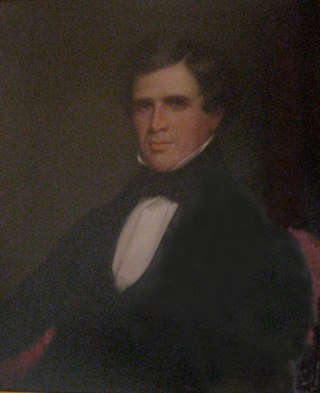
The 1848 United States presidential election was the 16th quadrennial presidential election, held on Tuesday, November 7, 1848. In the aftermath of the Mexican–American War, General Zachary Taylor of the Whig Party defeated Senator Lewis Cass of the Democratic Party.

The 1852 United States presidential election was the 17th quadrennial presidential election, held on Tuesday, November 2, 1852. Democrat Franklin Pierce defeated Whig nominee General Winfield Scott. A third party candidate from the Free Soil party, John P. Hale, also ran and came in third place, but got no electoral votes.
Southern Democrats are affiliates of the U.S. Democratic Party who reside in the Southern United States.

James Chamberlain Jones was an American politician who served as the tenth governor of Tennessee from 1841 to 1845, and as a United States Senator from Tennessee from 1851 to 1857. A Whig, Jones twice defeated future U.S. President James K. Polk for the governorship, in 1841 and 1843. He was the first native-born Tennessean to be elected governor of the state.

Elections in Georgia are held to fill various state and federal seats. Regular elections are held every even year. The positions being decided each year varies, as the terms of office varies. The State Senate, State House and U.S. House will typically be up for election, as all of those positions have two-year terms. Special elections are held to fill vacated offices. Georgia is one of seven states that require a run-off election if no candidate receives a majority of the vote in a primary election. Uniquely, Georgia requires a run-off election for state and congressional offices if no candidate wins a majority of the vote in a general election; only Louisiana has a similar requirement, but it operates under a different election system.

There have been 91 gubernatorial elections in the state of New York since 1777, with the most recent being held on November 8, 2022. The next election is scheduled to be held on November 3, 2026.
The following table indicates the party of elected officials in the U.S. state of Georgia:
Since the Great Depression, Rhode Island politics have been dominated by the Rhode Island Democratic Party, and the state is considered part of the Democrats' "Blue Wall." Democrats have won all but four presidential elections since 1928, with the exceptions being 1952, 1956, 1972, and 1984. The Rhode Island Republican Party, although virtually non-existent in the Rhode Island General Assembly, has remained competitive in gubernatorial elections, having won one as recently as 2006. Until 2014, Democrats did not win a gubernatorial election in the state since 1992, and it was not until 2018 that they won one by double digits. The Rhode Island General Assembly has continuously been under Democratic control since 1959.
The 1839 Massachusetts gubernatorial election was a tightly contested race won by Marcus Morton. Under Massachusetts law at the time, a majority of the votes cast was required to win, and Morton received exactly half the votes cast. Despite the presence of some irregularities, incumbent Whig Governor Edward Everett refused to contest the results once a legislative committee dominated by his party accepted a report giving Morton 51,034 votes out of 102,066 cast.
The 1856 Massachusetts gubernatorial election on November 4. Incumbent Know-Nothing Governor Henry J. Gardner was re-elected to a third term. He benefited greatly from a deal with the state's new Republican Party, which agreed not to field a candidate in exchange for Gardner's support of presidential nominee John C. Frémont. With no serious challenger in the field against him, Gardner easily defeated Democrat Erasmus Beach and George W. Gordon, an American Party member running in support of the national ticket.

The 1851 Georgia gubernatorial election was held on October 6, 1851.

The 1839 Georgia gubernatorial election was held on October 7, 1839, to elect the governor of Georgia. The Democratic Union candidate Charles McDonald won the election defeating Whig State Rights Candidate Charles Dougherty, with the election being decided by 1,907 votes.

The 1835 New Hampshire gubernatorial election was held on March 10, 1835.

The 1841 New Hampshire gubernatorial election was held on March 9, 1841.

The 1842 New Hampshire gubernatorial election was held on March 8, 1842.

The 1841 Vermont gubernatorial election was held on September 7, 1841.

The 1834 Indiana gubernatorial election took place on August 4, 1834, under the provisions of the Constitution of Indiana. It was the seventh gubernatorial election in the State of Indiana. The incumbent Whig governor Noah Noble defeated Democratic former state representative James G. Read. The election took place concurrently with elections for lieutenant governor and members of the Indiana General Assembly. This was the first gubernatorial election in Indiana contested on a partisan basis.

The 1831 Georgia gubernatorial election was held on October 7, 1833, to elect the governor of Georgia. Incumbent Democratic Union Governor Wilson Lumpkin narrowly defeated National Republican Troup nominee Joel Crawford

The 1835 Georgia gubernatorial election was held on October 5, 1835, to elect the governor of Georgia. Democratic Union Governor Wilson Lumpkin, first elected in the 1831 election, did not seek re-election to a second term, instead he became U.S. commissioner to the Cherokee Native Americans. Democratic Union candidate William Schley, U.S House rep for Georgia's 1st congressional district, narrowly defeated Whig State Rights candidate Charles Dougherty.

The 1835 Georgia gubernatorial election was held on October 2, 1837, to elect the governor of Georgia. In a major upset, thanks in part to the Panic of 1837, Whig State Rights candidate and Ex-Governor George R. Gilmer beat incumbent Democratic Union Governor Willam Schley.
















